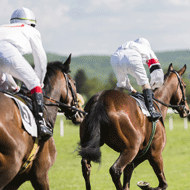Horse racing body changes flu vaccination rules

Earlier this year, a number of influenza outbreaks were confirmed in vaccinated racehorses across the country, prompting races to be cancelled for nearly a week.
Racehorses will need to be vaccinated against equine influenza every eight months from 2020, under new rules introduced after a series of disease outbreaks earlier this year.
The British Horseracing Authority (BHA) introduced a temporary measure in February, requiring all horses in training to have a booster vaccination every six months. Boosters were previously required only once a year.
The decision came after a number of influenza outbreaks in vaccinated racehorses across the country, prompting all races to be cancelled for nearly a week. Vets at the Animal Health Trust revealed that a new strain of equine influenza - Florida Clade 1 H3N8 - was responsible for the outbreaks.
Whilst cases were identified in vaccinated horses, the current vaccine offers a greater degree of protection than previously thought, particularly when a booster has been recently administered. Vaccinated horses show milder symptoms and recover more quickly, the trust says.
The BHA’s veterinary committee recommended six months as the optimum period for vaccine renewal, however the BHA said it has taken trainers’ views into account that this may result in horses being vaccinated during their racing seasons. As a compromise, eight months will become the new standard from 1 January 2020.
In the meantime, from 1 May 2019, horses presented at racecourses will need to have been vaccinated against equine influenza within the past nine months.
BHA also announced that from 1 May, British-trained runners from licensed yards will no longer require a health declaration form to be submitted on arrival at the racecourse. International runners and Hunter Chasers from unlicensed yards will still be required to provide the declaration and a negative result for equine influenza, no more than 72 hours prior to arrival at the racecourse.



 The Veterinary Medicines Directorate (VMD) is inviting applications from veterinary students to attend a one-week extramural studies (EMS) placement in July 2026.
The Veterinary Medicines Directorate (VMD) is inviting applications from veterinary students to attend a one-week extramural studies (EMS) placement in July 2026.